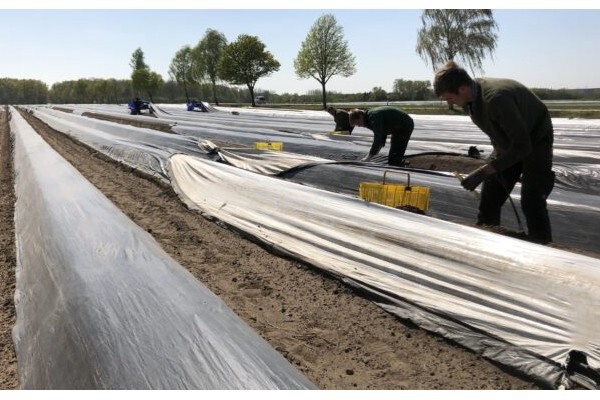Lower Saxony's fruit and vegetable producers, as well as asparagus and berry producers, are looking with concern at the current coalition negotiations in Berlin. This is due to the planned increase in the minimum wage to €15 from 2026, a demand of the coalition partner SPD. Claus Schliecker, chairman of the Lower Saxony Fruit Growers' Association, and Thorsten Flick, managing director of the Network of Asparagus and Berry Associations, emphasize the urgency of a special regulation for agriculture. The two industry representatives see the increase in the minimum wage as a massive threat to the competitiveness and existence of many businesses. "In order to continue producing domestic vegetables and fruit, there must be a special regulation for short-term employees in agriculture and horticulture," they demand. The largest cost factor in labor-intensive fruit and vegetable production is the labor costs, which make up to 60 percent of operating expenses.
 © LPD
© LPD
"We went into the federal election campaign with great expectations and addressed our concerns for the necessary political change to responsible members of parliament and politicians in various letters," Schliecker and Flick told the Landvolk press service. Since the introduction of the minimum wage in 2015, almost 30 percent of asparagus businesses have already had to give up, and the harvest of strawberries has fallen by 30 percent. A further increase could exacerbate this development. "That's why we launched a postcard campaign last fall to draw attention to the issue, and we've now sent another urgent appeal to the responsible politicians," Flick explains.
"We are not against a minimum wage for permanent employees, but we need this exception for harvest work in order to remain competitive to some extent," Flick and Schliecker make it clear that it is not about the wage level itself, but the exception to the minimum wage should be created for work that does not require training, that seeks an additional source of income or that is seasonal. In Germany, the current minimum wage is €12.82, while in Romania, it is €4.87, in Turkey, €3.75, and in Bulgaria, €3.32. "We are clearly feeling the enormous competitive pressure from producers both within and outside Europe," explains Flick. Raspberry growing is particularly affected, he says, and has almost come to a complete standstill, while the produce is now increasingly coming from Egypt and Spain.
Disadvantages for consumers and the environment
The promised change in policy must now take place, criticizes Claus Schliecker. "It is not enough to replace the politicians; the policy must change," he demands. The rollback regarding agricultural diesel is not enough to relieve the burden on specialty crop farms. The rising labor costs will make products more expensive and put domestic businesses under further pressure. In addition to the economic consequences for the companies, Schliecker also sees disadvantages for consumers and the environment. Moving production abroad brings with it problems such as uncontrolled use of pesticides, longer transport routes, and questionable social working standards. "We produce healthy food for a balanced diet and make an important contribution to food security. Every consumer should be able to afford German fruit and vegetables," emphasize Schliecker and Flick.
While the asparagus season in Lower Saxony has gotten off to a promising start thanks to favorable weather conditions, fruit growers are still waiting for the season to begin. Nevertheless, uncertainty remains high. The farmers are eagerly awaiting a positive decision in Berlin that will secure a future for their family businesses.
Source: LPD
